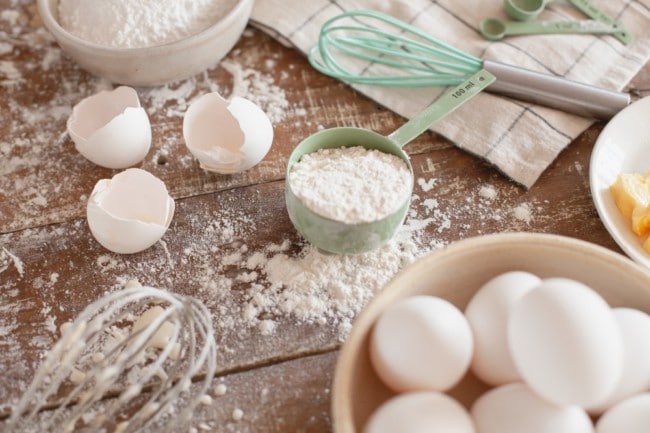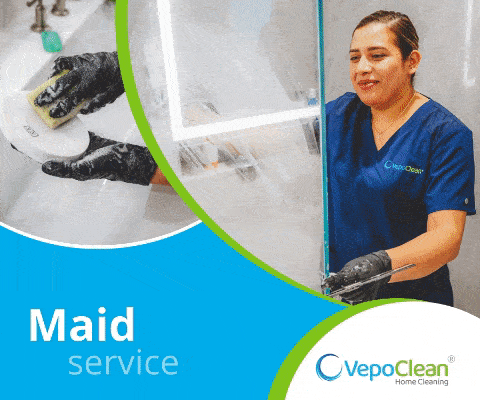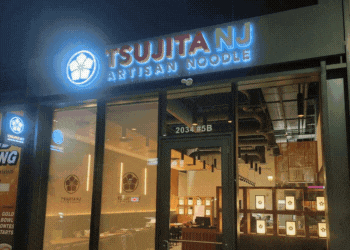Maybe your Mom has a legendary cinnamon roll recipe, or you perfected your sourdough during the early days of Covid. Whatever the inspiration, for anyone considering turning their home baking into a brand, there is a special permit in New Jersey for home bakers and makers to sell their products commercially. The Cottage Food Operator permit was created in Fall 2021, and as of May 2022, there are 28 permit holders in Hudson County, making everything from custom cakes and cookies to specialty doughnuts and more. Since Hoboken is home to many other delicious things like the Oreo and the Twinkie, we took a look around to see what new classics are being created. The Hoboken Girl spoke to some local bakers about their businesses and the impact of the new permit. Read on to learn more about these (quite literally) home-grown businesses.
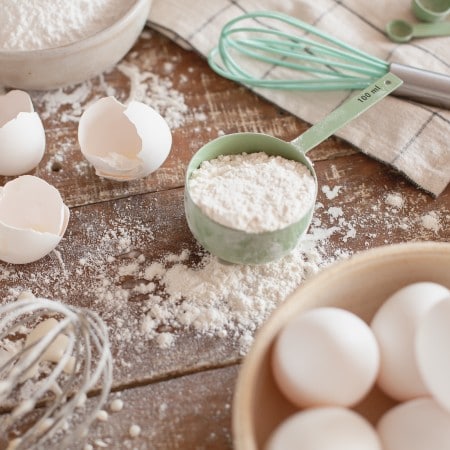
About the Permit
The Cottage Food Operator permit was officially launched in October 2021, but the path to the permit began in 2017. The term ‘cottage food’ refers to food produced in a residential home or other designated space and sold directly to a consumer. While every other state in the US had some sort of law permitting this type of sale, New Jersey had an outright ban on the commercial sale of home-prepared foods. The laws across the country vary in their specifics — for example, some states have a revenue limit for home producers, and others have limits on what kinds of food can be produced and sold.
In 2017, the New Jersey Home Bakers Association sued the New Jersey Department of Health to challenge the ban. The NJHBA focuses on economic development, freedom of choice for producers and consumers, and food safety while seeking to make the sale of home-baked goods attainable for New Jersey producers. The NJHBA partnered with the Institute for Justice to do the advocacy work required to change the law. In June 2020, the Department of Health initiated the formal rulemaking process, establishing the cottage food operator permit.
The rule was finalized in October 2021, opening up new opportunities to home producers across the state. Observers note that the state’s final rule created a schema that was both affordable and easy to comply with. It also created clear limits to what the permit does not allow. To get started, the application is $100, the permit application is online, and the requirements for compliance focus on food safety and labeling. All permit holders are required to pass an accredited Food Protection Manager course and test.
Several of the makers HG spoke with pointed to the NJHBA Facebook page as an invaluable resource as they went through the permitting process. Between study guides for the food safety tests, support from peers who had ‘been there + done that,’ and resources about how to complete the application, there was a lot of information available online.
“Just knowing how much work went into getting this rule changed is incredible,” said Greg Marx of Laurel Bakery. The Food Protection Manager certification was also mentioned by several of the makers as a useful resource for running a kitchen in general.
While the bulk of the law describes what makers can do, a couple of provisions describe what they can’t do. First, a revenue limit of $50,000 per year means that makers have to be deliberate in how they run their businesses. Approaching the revenue cap means that the business owner would have to consider whether the cottage permit is really the best fit or whether they should move the business into a commercial kitchen and change the licensing schema.
Second, because no temperature-controlled (TCS) foods are permitted to be sold using the cottage food permit, it limits what can be produced and sold. A non-TCS food does not need time and temperature controls to remain safe for consumption. This keeps the cottage food permit focused on temperature-stable foods like baked goods, popcorn, dried pastas, jams, and other items.
Read More: Where to Find Gluten-Free Baked Goods in Hoboken + Jersey City
Hudson County Permit Holders
The Hoboken Girl was able to connect with several of Hudson County’s cottage food permit holders. These are all small businesses operating right here in Hudson County. Each one has a set menu but also takes custom orders.
For some of the makers, the cottage food permit has been the long-awaited green light to start their own business. For others, it’s created an affordable way to experiment with an idea or grow a hobby without having to commit to renting a space on their own or in a commercial kitchen. Renting a space in a commercial kitchen can cost over $100 an hour, the time has to be scheduled in advance, and makers are restricted in what they can store on site. Being able to produce from home has been a big opportunity for local bakers.
Here is a list of some local Hudson County cottage food permit holders.
alpa Chocolate

Pat Christodulidis and her husband, Alex, had a problem. They are Swiss, and with no Swiss chocolate available during Covid lockdowns, things were getting desperate. “We had no family visiting, and there were no trips to and from Switzerland. So I learned how to make chocolate,” Pat said. Pat’s job working in production design for film and theater was on hold because of the pandemic, so she had plenty of time to experiment.
Through trial and error in her Jersey City kitchen, Pat perfected what is now alpa chocolate’s signature product: premium chocolate bars made with single bean, organic chocolate. “I watched thousands of hours of videos online, read articles, and kept experimenting,” she said. “I gave away hundreds of pounds of chocolate bars as I perfected the recipe.” From start to finish, it all happens at her home. She roasts the beans, makes the chocolate, and pours it into molds. Her neighbors are the beneficiaries of both the amazing smells and the test products.
In 2021, Pat and Alex started researching how to get more serious with her new hobby. The costs and logistics of renting a commercial kitchen were prohibitive and also more of a commitment than they were ready to make. The cottage food permit came along at just the right time. Pat was able to obtain the permit and successfully apply for the Van Vorst Park Farmers Market in time for the summer 2022 season. alpa chocolate made its debut at the Memorial Day weekend market.
What makes alpa chocolate special, Pat says, is its commitment to the finest quality beans. “Even the production environment of the beans matters,” she said. “We only buy from farmers who use fair-trade and fair-wage practices.” Each bar is made with a single type of bean which has its own flavor profile. “The beans are a lot like wine, because the taste is impacted by the growing conditions,” Pat said. “We want to educate people about the ways they can taste chocolate like they can taste wine or cheese and learn about the different flavor profiles.”
Pat, who has lived in New Jersey for ten years, says she was intimidated to start at first. “The feedback is really important to me. Even after the first day at the market, people came back to talk to me about what they liked or noticed about the chocolate,” she said. She says that she will use the data she has gathered from customers this year and continue to research through Memorial Day Weekend 2023 to decide what’s next for the company. “I want to grow the company in a way that’s reasonable and sustainable,” she said. “If people truly enjoy it, it brings joy, and brings knowledge to people, and brings people together, then I will take it up a notch.”
How to purchase: Visit alpa’s Instagram or stop by the Van Vorst Park Farmers Market on Saturdays.
Baked in Boken

(Photo credit: @bakedinboken)
Hoboken resident Danielle Levy graduated from Stevens Institute in 2016 and uses baking as a way to honor her family’s traditions, as well as share the delight of baked goods with others. Danielle grew up baking with her Grandmother, Selma, and knows how special it is to share a treat with someone. “Knowing that people are sharing my baked goods amongst friends and family is really special,” Danielle says. Baked in Boken specializes in everything made from scratch: the main products are cupcakes, cookies, custom cakes, and small-batch baked goods like brownies and doughnuts.
Danielle is a full-time project engineer and bakes part-time. Prior to getting her cottage food permit, she was renting space in a commercial kitchen. The arrangement had its pros and cons; being able to meet other bakers was great for expanding her network, but the logistics, costs, and time commitment were challenging. Getting the cottage permit meant a lot more autonomy for Danielle.
“Instead of having to spend time thinking about getting to and from the commercial kitchen, managing storing ingredients, etc, I can spend more time working with clients to get their orders just right,” she said. Danielle views getting the permit as proof that she can be successful in complying with the food safety regulations. “The rules are strict for a reason, and it’s satisfying to be able to show that I am compliant,” she said.
Danielle says that she would like to expand Baked in Boken’s offerings to include one of Grandmother Selma’s specialties, rugelach. “I’d like to offer more traditional Jewish recipes, especially challah bread on Fridays,” she said. “We used to always make that together and I’d like to use the same flour she did, Hecker’s flour. I would love to share that tradition.”
How to purchase: Via Instagram
Baked on 50th
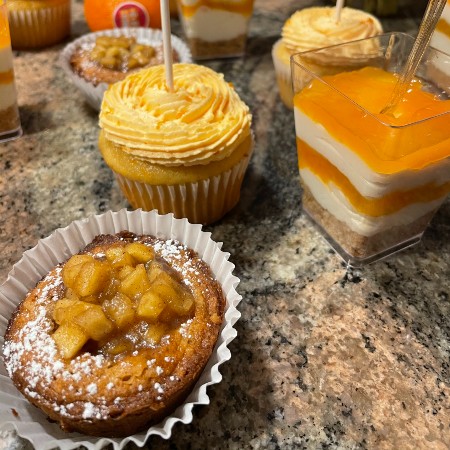
Nathalia Soto has been baking as a hobby for about ten years, and like many people, turned to baking during the pandemic. “I got pretty serious about working on my baking and started my business in spring 2021,” she said. Getting the cottage food permit was a green light for her to expand her business beyond baking for family and friends. “I took the [food safety] test, I passed, did everything else that was required, and got the permit,” she said. “It was helpful to know that I was following the rules.” Word grew about her business through coworkers, friends, and Instagram.
Nathalia has a full-time job working at the North Hudson Community Corporation and bakes part-time out of her home in West New York. The menu has a new item every month, but some popular items are apple cups and brownies. Nathalia says that her favorite item is the cheesecake cupcake. “I love cheesecake and I have flavors that no one else offers,” she said. “I made the passion fruit syrup for the passion fruit flavor myself, and my grandmother, Grecia, makes the guava marmalade for the guava flavor.”
How to purchase: Via Instagram
Do Good Donuts
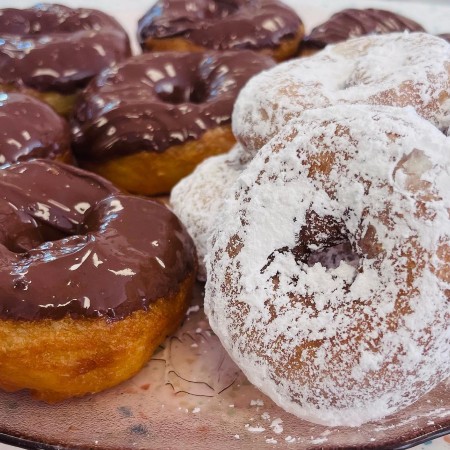
(Photo credit: @dogood_donuts)
Emily Wirt, a current Hoboken resident, explains that the doughnut culture in her native California is a lot different than what we have here on the East Coast. “Instead of chains like Dunkin’ or Krispy Kreme, there are a lot of small shops, in particular, mom and pop shops,” she said. A craving for a homestyle doughnut led her to her kitchen to experiment. The Covid lockdown of 2020 proved to be the ideal time for her to work on the doughnuts. As she improved and started giving away doughnuts to friends and neighbors, the happy recipients wanted to offer her money. She donated the money to non-profits, mainly to support Covid relief and front-line workers.
At the same time, Emily started thinking about how she could scale up her doughnut-making hobby into something else. Her sister, who lives in Oregon, operates a business under Oregon’s cottage food producer laws, so Emily was encouraged to see what New Jersey had to offer that was similar. “In early 2021, I got a space in a commercial kitchen and started doing pop-ups,” she said. Emily continued doing pop-ups here and there, and got her cottage food permit in late 2021. “Now, I can pop up anywhere. Having the permit has opened up a lot of opportunities for me,” she said. Even when there are no popups or other events, she can take orders directly.
In early 2022 when it was very cold and Omicron was surging, Emily got a boost of confidence from one of her customers. “I was delivering doughnuts on my bike and the Instagram account Hoboken Foodie reshared their order. Things really took off after that and it really made me think I could do this full time,” she said. Emily quit her corporate job in March 2022 and has been freelancing and otherwise making doughnuts full time.
As for the do-good aspect, Emily says that that is an essential part of her business. “My goal is for people to be more intentional in how they consume. I encourage customers to bring their own containers and buy my supplies locally,” she said. “I buy my flour, butter, and dairy products from Bone-In Food, which is a supplier based in Jersey City. I can’t wait for the farmers markets so I can get fresh fruit and other ingredients.” In terms of giving back, each month, Emily has made a donation to a charity whose mission she believes in. So far, in 2022, Emily has made doughnut-fueled donations to Sustainable JC, Welcome Home Jersey City, and the Hoboken Shelter, to name a few.
How to purchase: Via Instagram; and most Saturdays at 9AM until sold out at Into The Void Antiques, 117 Brunswick Street, Jersey City.
Double Dough
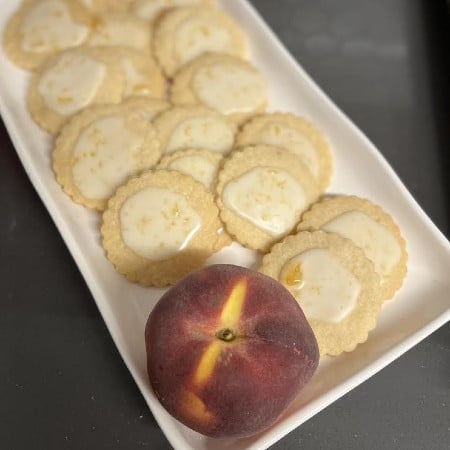
(Photo credit: @double_dough)
Hoboken sisters Jordan and Joelle Hernandez started making decorated cookies in 2014 and had fun working on their craft. As their skill improved, friends and family asked for cookies for special occasions and parties. At the same time, the sisters started an Instagram account to showcase their work. People would contact them to order cookies, but given the outright ban on home baking, it was a bit tricky. Joelle said that they were often offered money to cover costs of ingredients. “Any overage in money we would donate to a charity, so we figured that maybe we could take orders in the case of a fundraiser,” she said.
Starting in 2020, they did a handful of fundraisers for various causes, but had to be precise in sharing their work as home bakers. “The only time we promoted ‘selling,’ the profits were going to another organization,” Joelle said. Also in 2020, the two were featured in an article about Christmas baking in Gannett Newspapers. This, plus their continued social media presence, led to them being cast in the baking competition show Baking It on NBC during the 2021 holiday season. This whole time, the sisters were still operating as home bakers, yet had to keep their Instagram account full of their latest bakes to showcase both their skill and their personalities. “The producers of Baking It found us through our Instagram,” Joelle said.
While both sisters still maintain their full-time jobs, the cottage food producer permit has been a game-changer for them as home bakers. “We are able to take on more orders, bigger orders, and it’s a lot easier to stay within the rules,” Joelle said. “Everything is more straightforward now.” In fact, right after their permit arrived in February 2022, an order for 1500 cookies came in, marking the largest order the sisters had ever completed. “The scope [of what we can do] has increased. Prior to the permit, a large order might be 50 cookies,” Joelle said. “Now, a large order is 150 cookies.” Being able to bake from home has given the women more flexibility in fulfilling orders on their own time. The only challenge is one many Hobokenites can relate to: not enough storage. “Our parents live in Central Jersey and we use their home as almost a satellite storage location for extra ingredients,” Joelle said.
How to purchase: Via Instagram
Laurel Bakery
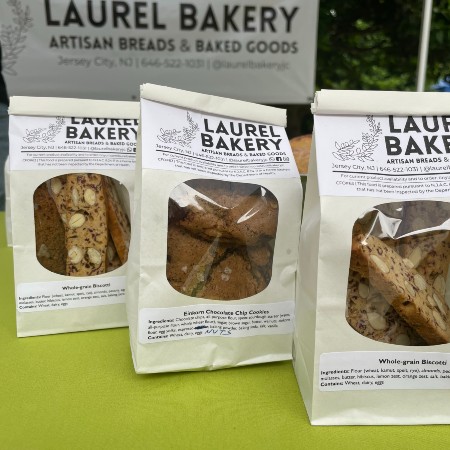
Jersey City resident Greg Marx began baking simple breads for fun in 2017. He continued to improve his baking, and by late 2019, had worked out an agreement with a commercial kitchen near his home to use the space so he could bake and sell at the Van Vorst Park Farmers Market. “Of course, that was right before the pandemic, so it never happened,” Greg said.
He kept at it, trying new recipes and baking for friends and family. As his baking skills leveled up, he looked for new ways to share his bakes. He learned of the NJHBA’s efforts to get the cottage permit law changed, so kept an eye out for the rule change. “Once the permit was available, I applied right away,” Greg said. “The process was straightforward and easy to follow.” In fact, the only hiccup Greg encountered was from a state examiner who didn’t believe he would be able to make bagels in his kitchen. “The permit examiner called me and was skeptical that I could make bagels in my kitchen,” Greg said. “I had to reassure him that yes, I’ve done this before, and it’s fine at this scale.”
Greg’s business, The Laurel Bakery, has an online storefront where Greg takes orders from customers and he has a booth at the Hamilton Park Farmers Market every other week. Typical items for sale include breads, crackers, bagels, cookies, and biscotti. According to Greg, the most popular items are the sourdough boule and the bagels. But baking for himself, Greg says his favorite is the einkorn boule with barley.
How to purchase: Via Instagram; and every other week at the Hamilton Park Farmers Market (Wednesdays at 4PM)
Petit Four by Samia
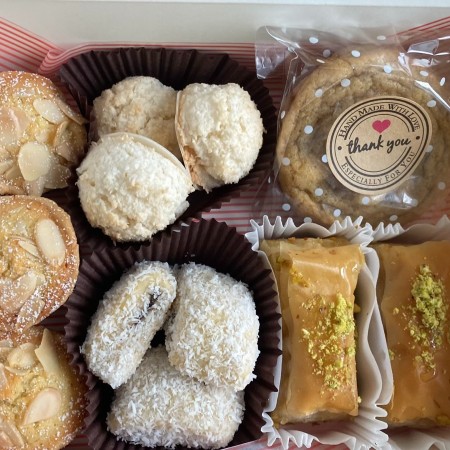
Samia Aissi came to Hoboken in 2020 by way of Germany from her native Tunisia. As a child, she would work with her mother in her mother’s bakery. “She owned a traditional bakery in Tunisia. I use her recipes,” Samia said. The Tunisian recipes Samia uses have African, Middle Eastern, and French influences. While she makes American treats like cookies and cupcakes, her more popular items include Turkish baklava, petit fours, and almond tarts. “Everything is fresh,” she said. “There is no alcohol, no artificial flavors in my recipes. I get an order and I give a lot of time and care to it.”
Samia started with a pop-up in her apartment building, and her neighbors loved it. “My neighbors encouraged me, and it was a sellout,” Samia said. She got her cottage food permit and now takes custom orders and appears at other popup events. “I have no schooling as a baker but Americans like treats so I tried it,” she said. “I bake from my heart. I believed I could make it happen and I did.”
How to purchase: Via Instagram
See More: Portuguese + Latin Bakeries You Should Visit in Newark
The Thirsty Baker
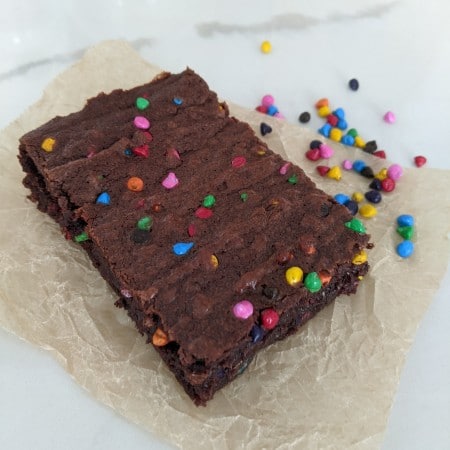
Emily Hokanson is the person behind The Thirsty Baker, which specializes in premium brownies. Emily, who lives in Jersey City, is a part-time baker and a full-time project manager at Mars-Wrigley. Her passion for baking and sharing community started in high school, when she worked at a local sweets shop in her hometown of Cedar Brook, Wisconsin. The shop featured hand-dipped caramel apples and Belgian chocolates. “It was so fun and such a great way to connect with the community. People got so much joy out of coming into the store, taking in the delights of the sweet treats,” she said. Emily said she had always loved to cook, bake, and gather people together over something delicious. In college, she took a path that aligned her professional and personal interests and majored in Biological Systems Engineering.
She interned with Mars-Wrigley in college and has worked there since graduating from the University of Wisconsin, Madison, in 2014. “Working at Mars, I’m in the confection space, but I’m also around people who have had similar projects on the side,” Emily said. “I am inspired by them and was able to learn about the cottage food permitting process from one woman in particular who had done something similar with candy.”
During the same time that the cottage food permit came out in New Jersey, Emily was taking an entrepreneurship course through the non-profit, Rising Tide Capital, and working on a business plan for her dream of owning a cafe/bakery with a community gathering space. “Getting the permit was a really affordable way for me to experiment with recipes and see what works without a huge or costly commitment,” she said. “It’s very low risk and it enabled me to get started.”
Emily says that a year from now she’d like to have The Thirsty Baker at markets three or four times a week, and be on her way to owning that cafe. “To be able to grow and expand and support that growth would be ideal,” she said.
How to purchase: Via Instagram; the Van Vorst Park Farmers Market on Saturdays. 

